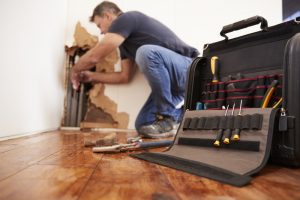 First, we want to stress that all “do-it-yourself” attempts to fix or install residential plumbing are bad. It’s simply unwise to try this type of work unless you have the proper tools and training. But there are times when DIY jobs go past bad and become serious problems. Ask any professional plumber, and you’ll often hear the same story: the majority of repairs they make are due to amateur plumbing errors.
First, we want to stress that all “do-it-yourself” attempts to fix or install residential plumbing are bad. It’s simply unwise to try this type of work unless you have the proper tools and training. But there are times when DIY jobs go past bad and become serious problems. Ask any professional plumber, and you’ll often hear the same story: the majority of repairs they make are due to amateur plumbing errors.
If you’ve never done any DIY work on your plumbing, you could still have troubles. A previous owner may have done some unlicensed repair or installation that you’ll end up having to deal with. No matter how cautious you are about only hiring professional plumbers in Burlington, VT, you still may need to call us to remedy some amateur mistake.
We’ve put together a list of the DIY problems we often must fix for our customers.
The “Putting Humpty Dumpty Back Together Again” Disaster
“All the king’s amateur plumbers and all the king’s amateur tools couldn’t put the p-trap back together again.” We see this sort of mistake all the time: someone dismantled a part of the plumbing, and when trying to reassemble it, fit it back together incorrectly. The p-trap (the curved pipe section under a sink drain) is one of the frequent victims of this error, and it’s a common reason for leaks developing under sinks. The components of plumbing can seem like confusing puzzle-pieces to non-professionals, so please leave dismantling and reassembling to the actual pros.
The Gnawing Effects of Chemical Drain Cleaners
We’ve often caution homeowners against using store-bought chemical drain cleaners to unclog drains before. First, these chemicals don’t do a complete job of eliminating the material blocking the drain, allowing clogs to return in a short time. But the acidic chemicals in these cleaners are harmful for the drains. The chemical residue tends to remain behind in the drain, where it eats away at the material. Reactions with soap scum can also lead to pipe corrosion.
Pipes That Don’t Match
When amateur plumbers attempt to put in new plumbing pipes, they often cram in whatever material they have on hand, or else they make guesses about whether to use copper or different types of plastic. The result is a tangle of brass, copper, PEX, CPVC, steel, and iron. What’s wrong with this? Well, aside from some of these materials not working well for specific purposes (such as for hot water lines), contact between these different materials causes leaks and corrosion. Pipe layout and pipe connections are tricky and need to be left to the experts.
The Over-Tight Connection
You’ve probably experienced the trouble with overtightening a screw or a nut: it can end up damaging the surface above it or it strips away at the threads. This same principle applies to connections on plumbing, except the consequences are more dire because it leads to cracked pipes and serious leaks. It’s easy to go overboard trying to make plumbing water-tight, so leave the work to experts who have done hundreds or thousands of jobs before.
Red Rock Mechanical, LLC serves Northwest Vermont and Northeast New York. No matter the source of your plumbing woes, trust us to fix them.







